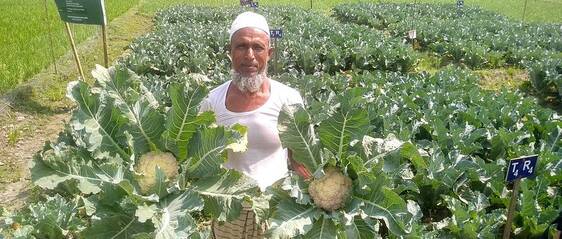
Soils4nutrition project
The project aimed to improve nutrition in soil, crops and the human continuum, particularly in locally produced and consumed foods.
Sustainable soil management for nutrition-sensitive agriculture in sub-Saharan Africa and Southeast Asia
The project, funded by the government of Germany, spanned a duration of three years and was piloted in Bangladesh, Burkina Faso, and Malawi. These countries were chosen due to their governments' recognition of the pressing need to address human nutrient deficiencies, especially within rural communities. The primary objective of the project was to enhance nutrition by focusing on the interconnectedness of soil, crops, and human health, particularly within locally produced and consumed foods. Key components of the project included: 1. Revision of existing documentation on sustainable soil management for nutrition-sensitive agriculture and identification of knowledge gaps. 2. Development of national capacities to bolster technical and local extension services, facilitating the implementation of sustainable soil management practices. 3. Strengthening the policy environment to encourage investment and technical cooperation, particularly in promoting sustainable soil management integrated with nutrition-sensitive agriculture and micronutrient management. This was supported by guidelines developed under the Global and Regional Soil Partnerships.
IMPACT AND OUTCOME
The expected impact of the project was to contribute to the improvement of food security and nutrition in the communities, while implementing and disseminating sustainable soil management practices. Several products were produced in the form of manuals, guidelines and approaches with potential for scaling up to other countries and regions around the world where the need for improving the nutrient content of food through soils was evident.
Outcome. Sustainable soil management practices for nutrition-sensitive agriculture identified, demonstrated through field trials in the target countries, and promoted using published technical documents and guidelines. The target audience of these guidelines was wide range of stakeholders, including government officials, policy makers, farmers, extension services and agricultural advisors, development partners, civil society, private sector and academia.
- Output 1: Research and development needs on sustainable soil management for nutrition-sensitive agriculture to tackle micronutrient deficiencies are identified, assessed and prioritized, bridging the gap between research and end-user communities on the linkages between soils and plant nutrition.
- Output 2: National capacities are developed to strengthen technical and extension services and mechanisms on the ground to implement sustainable soil management practices for soil conservation and rehabilitation that enables nutrition-sensitive agriculture for improved micronutrient supply. This is done through local field trials in the target countries to demonstrate and validate the previously identified sustainable soil management techniques.
- Output 3: The policy environment for investment and technical cooperation is strengthened in terms of promoting sustainable soil management that integrates nutrition-sensitive agriculture and micronutrient management, supported by related sustainable soil management guidelines on nutrition-sensitive agriculture developed under the Global and Regional Soil Partnerships.
KEY FACTS
Target countries: Bangladesh, Burkina Faso and Malawi
Contribution: 1 500 000 USD
Duration: December 2018 - November 2021
Resource partners: Federal Government of Germany – German Ministry of Food and Agriculture (BMEL)
Project code: GCP/GLO/730/GER
Project Title: Sustainable soil management for nutrition-sensitive agriculture in Sub-Saharan Africa and South East Asia
Contacts: GSP Secretariat, Carolina Olivera Sanchez
